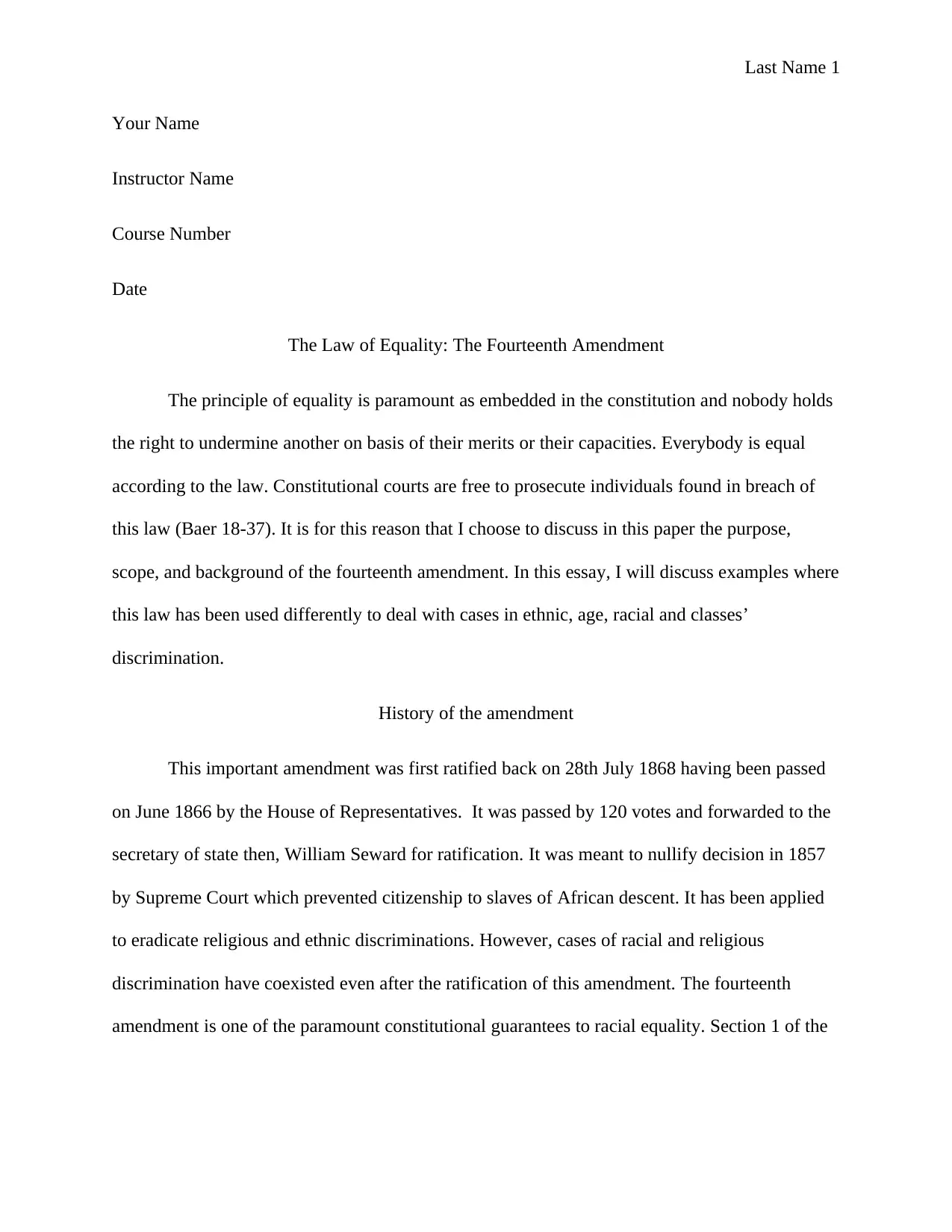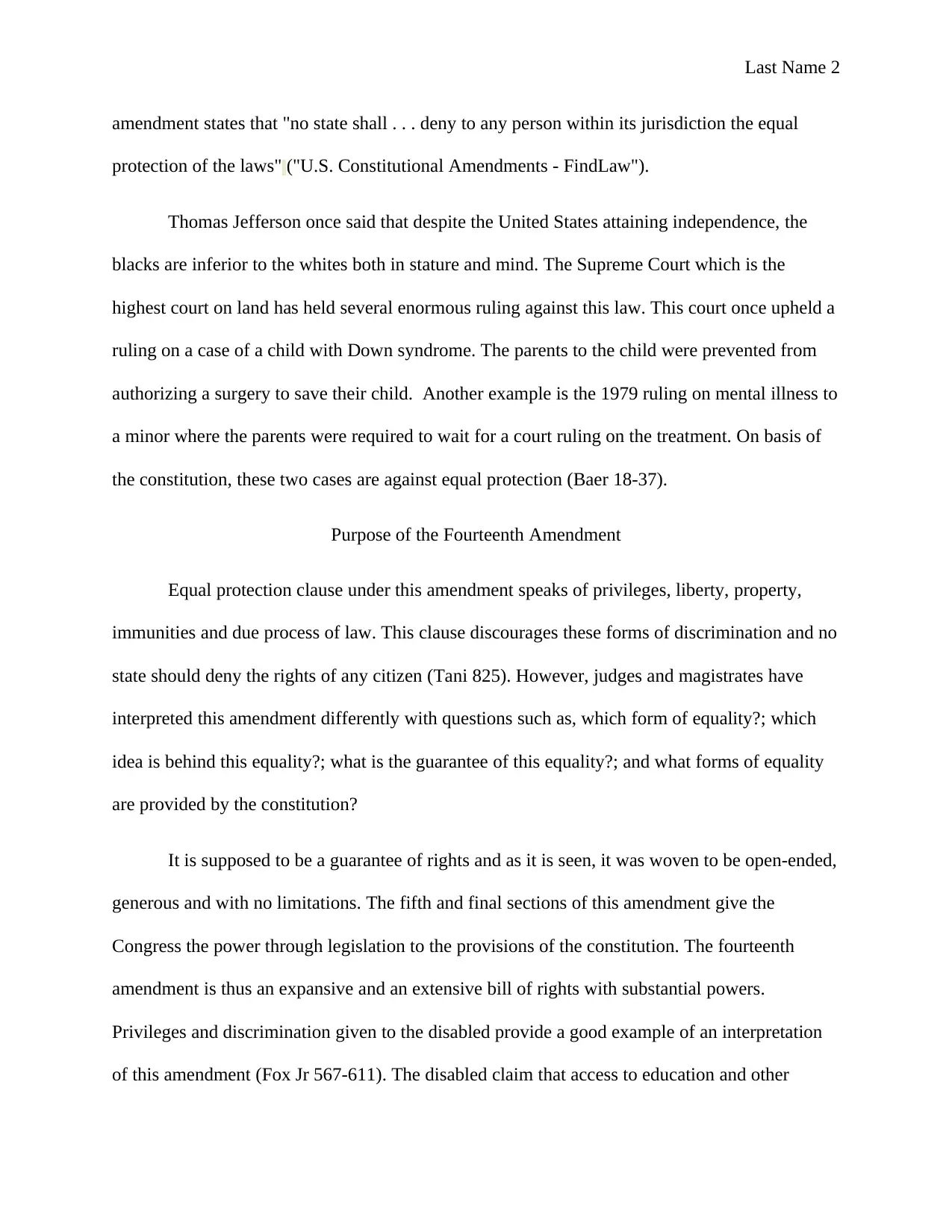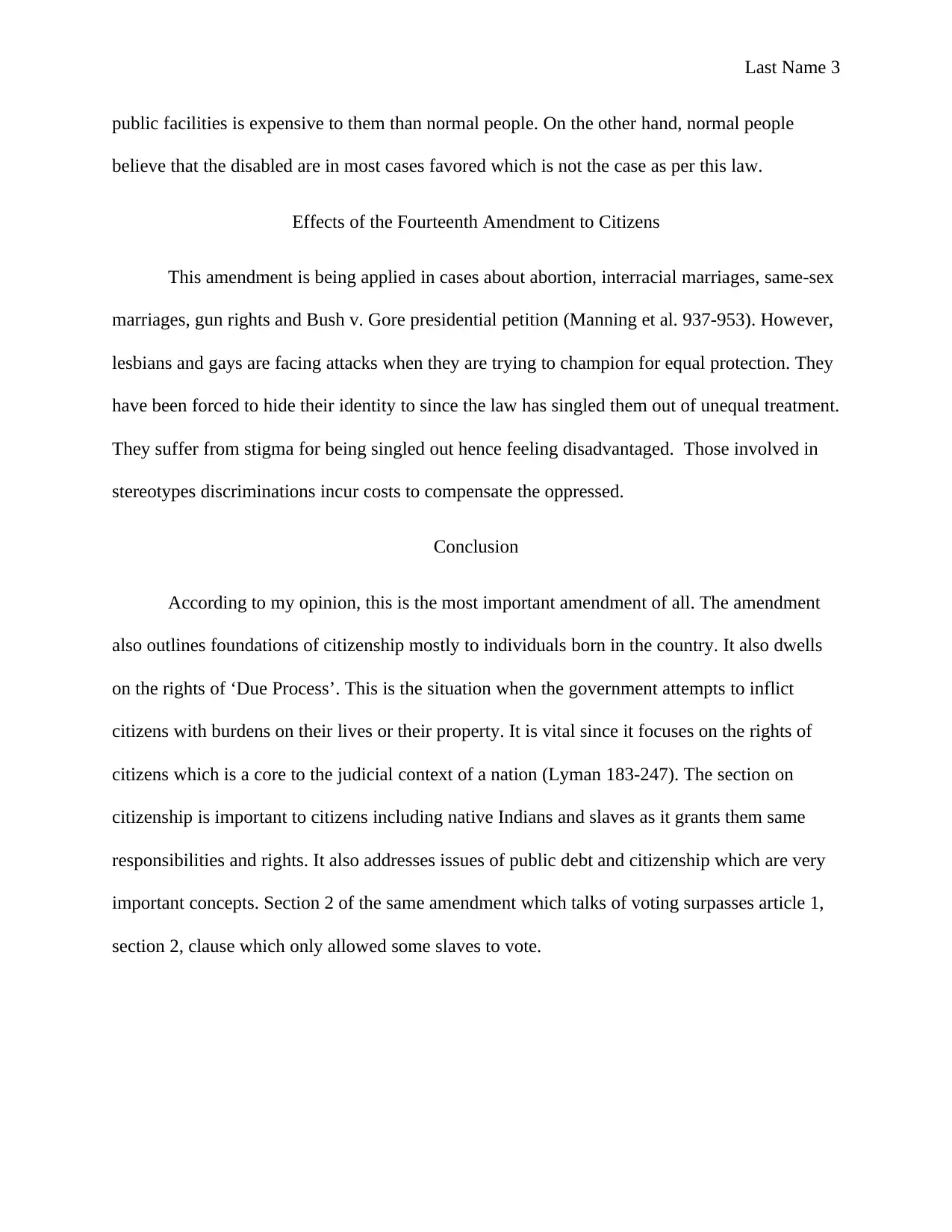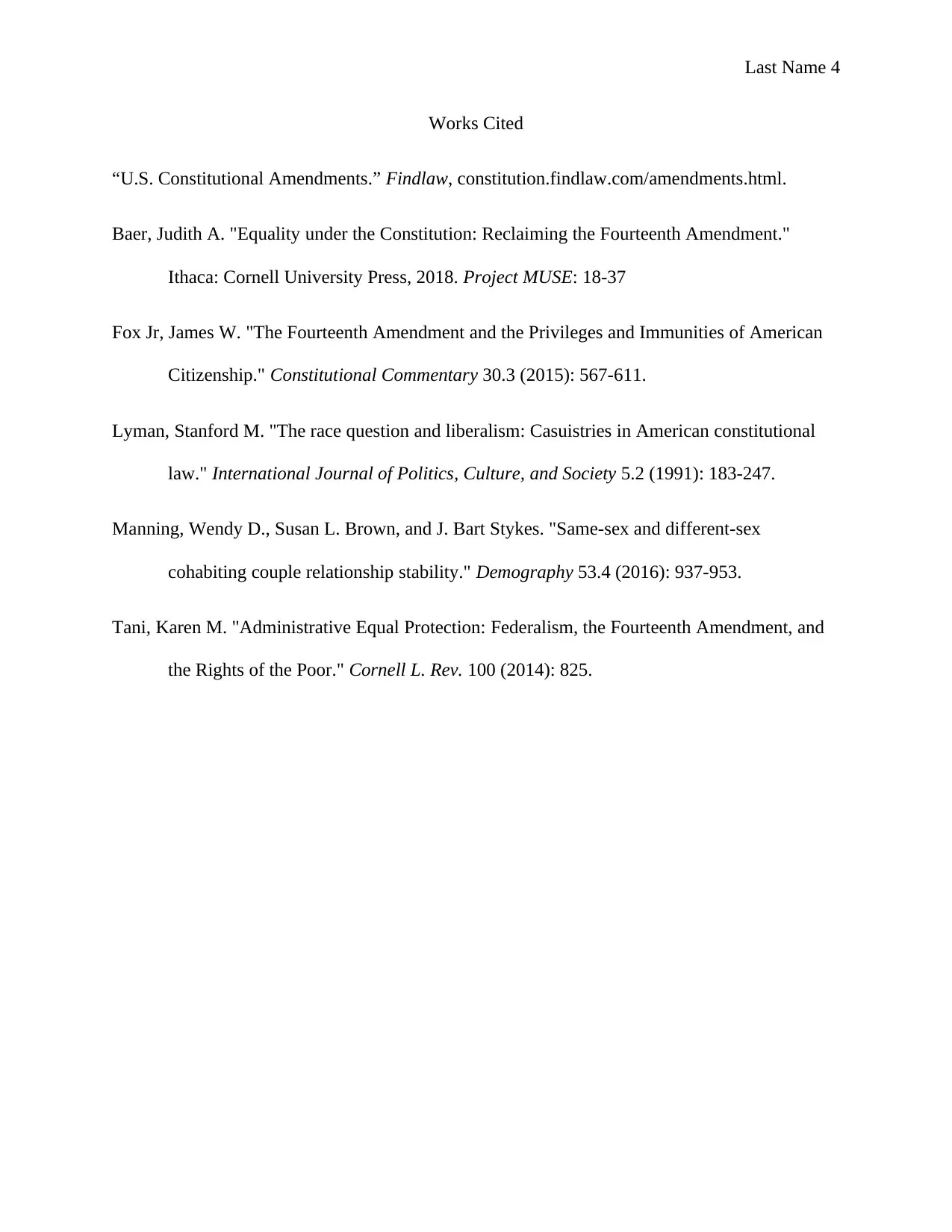The Fourteenth Amendment: Equality, Discrimination, and Legal Cases
VerifiedAdded on 2023/05/28
|4
|1060
|422
Essay
AI Summary
This essay delves into the Fourteenth Amendment of the U.S. Constitution, analyzing its historical context, purpose, and scope. It begins by outlining the amendment's ratification in 1868 and its aim to address issues of equality, particularly in response to the Supreme Court's prior decisions regarding citizenship for African Americans. The essay explores the amendment's role in combating racial, ethnic, and age-based discrimination. It examines specific cases, including those involving individuals with disabilities, to illustrate how the equal protection clause has been interpreted and applied. The essay further discusses the impact of the Fourteenth Amendment on various legal issues, such as abortion, same-sex marriage, and gun rights, concluding with an assessment of its significance as a cornerstone of citizenship and due process rights in the United States.

Last Name 1
Your Name
Instructor Name
Course Number
Date
The Law of Equality: The Fourteenth Amendment
The principle of equality is paramount as embedded in the constitution and nobody holds
the right to undermine another on basis of their merits or their capacities. Everybody is equal
according to the law. Constitutional courts are free to prosecute individuals found in breach of
this law (Baer 18-37). It is for this reason that I choose to discuss in this paper the purpose,
scope, and background of the fourteenth amendment. In this essay, I will discuss examples where
this law has been used differently to deal with cases in ethnic, age, racial and classes’
discrimination.
History of the amendment
This important amendment was first ratified back on 28th July 1868 having been passed
on June 1866 by the House of Representatives. It was passed by 120 votes and forwarded to the
secretary of state then, William Seward for ratification. It was meant to nullify decision in 1857
by Supreme Court which prevented citizenship to slaves of African descent. It has been applied
to eradicate religious and ethnic discriminations. However, cases of racial and religious
discrimination have coexisted even after the ratification of this amendment. The fourteenth
amendment is one of the paramount constitutional guarantees to racial equality. Section 1 of the
Your Name
Instructor Name
Course Number
Date
The Law of Equality: The Fourteenth Amendment
The principle of equality is paramount as embedded in the constitution and nobody holds
the right to undermine another on basis of their merits or their capacities. Everybody is equal
according to the law. Constitutional courts are free to prosecute individuals found in breach of
this law (Baer 18-37). It is for this reason that I choose to discuss in this paper the purpose,
scope, and background of the fourteenth amendment. In this essay, I will discuss examples where
this law has been used differently to deal with cases in ethnic, age, racial and classes’
discrimination.
History of the amendment
This important amendment was first ratified back on 28th July 1868 having been passed
on June 1866 by the House of Representatives. It was passed by 120 votes and forwarded to the
secretary of state then, William Seward for ratification. It was meant to nullify decision in 1857
by Supreme Court which prevented citizenship to slaves of African descent. It has been applied
to eradicate religious and ethnic discriminations. However, cases of racial and religious
discrimination have coexisted even after the ratification of this amendment. The fourteenth
amendment is one of the paramount constitutional guarantees to racial equality. Section 1 of the
Paraphrase This Document
Need a fresh take? Get an instant paraphrase of this document with our AI Paraphraser

Last Name 2
amendment states that "no state shall . . . deny to any person within its jurisdiction the equal
protection of the laws" ("U.S. Constitutional Amendments - FindLaw").
Thomas Jefferson once said that despite the United States attaining independence, the
blacks are inferior to the whites both in stature and mind. The Supreme Court which is the
highest court on land has held several enormous ruling against this law. This court once upheld a
ruling on a case of a child with Down syndrome. The parents to the child were prevented from
authorizing a surgery to save their child. Another example is the 1979 ruling on mental illness to
a minor where the parents were required to wait for a court ruling on the treatment. On basis of
the constitution, these two cases are against equal protection (Baer 18-37).
Purpose of the Fourteenth Amendment
Equal protection clause under this amendment speaks of privileges, liberty, property,
immunities and due process of law. This clause discourages these forms of discrimination and no
state should deny the rights of any citizen (Tani 825). However, judges and magistrates have
interpreted this amendment differently with questions such as, which form of equality?; which
idea is behind this equality?; what is the guarantee of this equality?; and what forms of equality
are provided by the constitution?
It is supposed to be a guarantee of rights and as it is seen, it was woven to be open-ended,
generous and with no limitations. The fifth and final sections of this amendment give the
Congress the power through legislation to the provisions of the constitution. The fourteenth
amendment is thus an expansive and an extensive bill of rights with substantial powers.
Privileges and discrimination given to the disabled provide a good example of an interpretation
of this amendment (Fox Jr 567-611). The disabled claim that access to education and other
amendment states that "no state shall . . . deny to any person within its jurisdiction the equal
protection of the laws" ("U.S. Constitutional Amendments - FindLaw").
Thomas Jefferson once said that despite the United States attaining independence, the
blacks are inferior to the whites both in stature and mind. The Supreme Court which is the
highest court on land has held several enormous ruling against this law. This court once upheld a
ruling on a case of a child with Down syndrome. The parents to the child were prevented from
authorizing a surgery to save their child. Another example is the 1979 ruling on mental illness to
a minor where the parents were required to wait for a court ruling on the treatment. On basis of
the constitution, these two cases are against equal protection (Baer 18-37).
Purpose of the Fourteenth Amendment
Equal protection clause under this amendment speaks of privileges, liberty, property,
immunities and due process of law. This clause discourages these forms of discrimination and no
state should deny the rights of any citizen (Tani 825). However, judges and magistrates have
interpreted this amendment differently with questions such as, which form of equality?; which
idea is behind this equality?; what is the guarantee of this equality?; and what forms of equality
are provided by the constitution?
It is supposed to be a guarantee of rights and as it is seen, it was woven to be open-ended,
generous and with no limitations. The fifth and final sections of this amendment give the
Congress the power through legislation to the provisions of the constitution. The fourteenth
amendment is thus an expansive and an extensive bill of rights with substantial powers.
Privileges and discrimination given to the disabled provide a good example of an interpretation
of this amendment (Fox Jr 567-611). The disabled claim that access to education and other

Last Name 3
public facilities is expensive to them than normal people. On the other hand, normal people
believe that the disabled are in most cases favored which is not the case as per this law.
Effects of the Fourteenth Amendment to Citizens
This amendment is being applied in cases about abortion, interracial marriages, same-sex
marriages, gun rights and Bush v. Gore presidential petition (Manning et al. 937-953). However,
lesbians and gays are facing attacks when they are trying to champion for equal protection. They
have been forced to hide their identity to since the law has singled them out of unequal treatment.
They suffer from stigma for being singled out hence feeling disadvantaged. Those involved in
stereotypes discriminations incur costs to compensate the oppressed.
Conclusion
According to my opinion, this is the most important amendment of all. The amendment
also outlines foundations of citizenship mostly to individuals born in the country. It also dwells
on the rights of ‘Due Process’. This is the situation when the government attempts to inflict
citizens with burdens on their lives or their property. It is vital since it focuses on the rights of
citizens which is a core to the judicial context of a nation (Lyman 183-247). The section on
citizenship is important to citizens including native Indians and slaves as it grants them same
responsibilities and rights. It also addresses issues of public debt and citizenship which are very
important concepts. Section 2 of the same amendment which talks of voting surpasses article 1,
section 2, clause which only allowed some slaves to vote.
public facilities is expensive to them than normal people. On the other hand, normal people
believe that the disabled are in most cases favored which is not the case as per this law.
Effects of the Fourteenth Amendment to Citizens
This amendment is being applied in cases about abortion, interracial marriages, same-sex
marriages, gun rights and Bush v. Gore presidential petition (Manning et al. 937-953). However,
lesbians and gays are facing attacks when they are trying to champion for equal protection. They
have been forced to hide their identity to since the law has singled them out of unequal treatment.
They suffer from stigma for being singled out hence feeling disadvantaged. Those involved in
stereotypes discriminations incur costs to compensate the oppressed.
Conclusion
According to my opinion, this is the most important amendment of all. The amendment
also outlines foundations of citizenship mostly to individuals born in the country. It also dwells
on the rights of ‘Due Process’. This is the situation when the government attempts to inflict
citizens with burdens on their lives or their property. It is vital since it focuses on the rights of
citizens which is a core to the judicial context of a nation (Lyman 183-247). The section on
citizenship is important to citizens including native Indians and slaves as it grants them same
responsibilities and rights. It also addresses issues of public debt and citizenship which are very
important concepts. Section 2 of the same amendment which talks of voting surpasses article 1,
section 2, clause which only allowed some slaves to vote.
⊘ This is a preview!⊘
Do you want full access?
Subscribe today to unlock all pages.

Trusted by 1+ million students worldwide

Last Name 4
Works Cited
“U.S. Constitutional Amendments.” Findlaw, constitution.findlaw.com/amendments.html.
Baer, Judith A. "Equality under the Constitution: Reclaiming the Fourteenth Amendment."
Ithaca: Cornell University Press, 2018. Project MUSE: 18-37
Fox Jr, James W. "The Fourteenth Amendment and the Privileges and Immunities of American
Citizenship." Constitutional Commentary 30.3 (2015): 567-611.
Lyman, Stanford M. "The race question and liberalism: Casuistries in American constitutional
law." International Journal of Politics, Culture, and Society 5.2 (1991): 183-247.
Manning, Wendy D., Susan L. Brown, and J. Bart Stykes. "Same-sex and different-sex
cohabiting couple relationship stability." Demography 53.4 (2016): 937-953.
Tani, Karen M. "Administrative Equal Protection: Federalism, the Fourteenth Amendment, and
the Rights of the Poor." Cornell L. Rev. 100 (2014): 825.
Works Cited
“U.S. Constitutional Amendments.” Findlaw, constitution.findlaw.com/amendments.html.
Baer, Judith A. "Equality under the Constitution: Reclaiming the Fourteenth Amendment."
Ithaca: Cornell University Press, 2018. Project MUSE: 18-37
Fox Jr, James W. "The Fourteenth Amendment and the Privileges and Immunities of American
Citizenship." Constitutional Commentary 30.3 (2015): 567-611.
Lyman, Stanford M. "The race question and liberalism: Casuistries in American constitutional
law." International Journal of Politics, Culture, and Society 5.2 (1991): 183-247.
Manning, Wendy D., Susan L. Brown, and J. Bart Stykes. "Same-sex and different-sex
cohabiting couple relationship stability." Demography 53.4 (2016): 937-953.
Tani, Karen M. "Administrative Equal Protection: Federalism, the Fourteenth Amendment, and
the Rights of the Poor." Cornell L. Rev. 100 (2014): 825.
1 out of 4
Related Documents
Your All-in-One AI-Powered Toolkit for Academic Success.
+13062052269
info@desklib.com
Available 24*7 on WhatsApp / Email
![[object Object]](/_next/static/media/star-bottom.7253800d.svg)
Unlock your academic potential
Copyright © 2020–2026 A2Z Services. All Rights Reserved. Developed and managed by ZUCOL.





